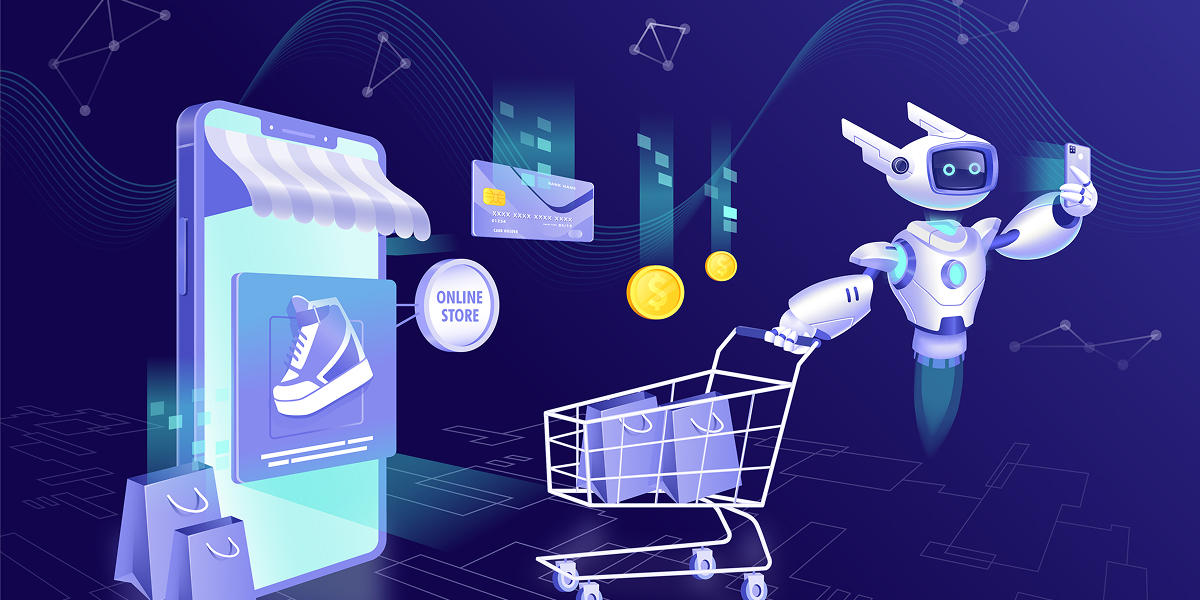Ecommerce transformation with AI: Driving efficiency, personalization, and scalable growth

Highlights:
- Ecommerce transformation blends AI, automation, and data to modernize digital retail.
- AI-driven personalization enhances customer engagement and loyalty.
- Predictive analytics empowers smarter decisions and proactive planning.
- Automation boosts efficiency by streamlining backend ecommerce operations.
- Intelligent search and visual recognition improve product discovery and UX.
- Cloud-powered AI infrastructure supports scalability and real-time agility.
In today’s fast-changing digital world, ecommerce transformation is no longer optional—it’s essential. With consumers expecting more and technologies evolving quickly, businesses must rethink how they operate and grow. Scalable, AI-driven solutions make this shift possible by streamlining processes and delivering real-time insights.
This blog outlines how AI-powered tools can fast-track ecommerce digital transformation, helping brands improve efficiency, personalize experiences, and scale sustainably.
Understanding Ecommerce Transformation
Ecommerce transformation is a strategic upgrade of digital commerce, combining technology, customer focus, and smarter processes. It moves businesses from traditional platforms to connected ecosystems powered by data, automation, and AI for seamless, personalized experiences. Beyond digitizing workflows, it drives innovation through new models, omnichannel strategies, modern payment systems, and automation. Tools like AI chatbots and predictive analytics are reshaping online retail as far as ecommerce transformation is concerned, enabling faster, more customer-centric growth.
Why it matters
Artificial intelligence brings unmatched speed, scalability, and accuracy to ecommerce operations. AI-driven solutions empower ecommerce businesses to automate repetitive tasks, personalize customer interactions, and make data-driven decisions with confidence.
Some common applications include:
- Automated Catalogue Creation: AI generates product listings that align with brand voice and target specific customer segments.
- Product Recommendations: AI analyzes browsing and purchase history to offer relevant products in real-time.
- Inventory Management: Predictive algorithms help forecast demand and optimize stock levels.
- Customer Service: Chatbots and virtual assistants handle customer queries 24/7 with efficiency.
- Dynamic Pricing: AI can adjust prices based on competition, demand, and other factors.
- Sentiment Analysis: AI tools analyze customer reviews and social media mentions to understand brand perception.
The result? Enhanced user experience, increased conversion rates, and better ROI. By minimizing manual work and improving accuracy, AI gives businesses a competitive edge in today’s crowded ecommerce marketplace.
Enhancing customer experience through personalization
Today’s consumers expect personalized shopping experiences. AI-driven personalization enables ecommerce businesses to deliver tailored content, offers, and recommendations that match individual preferences.
Machine learning models analyze vast data points—including location, device type, past purchases, and browsing behavior—to dynamically customize:
- Homepages
- Email marketing campaigns
- Push notifications
- Product recommendations
- Promotions and discount offers
Personalized experiences drive engagement, increase average order value, and foster customer loyalty—all vital components of a successful ecommerce transformation. Businesses that invest in personalization report significantly higher customer satisfaction and repeat purchases, making it a critical pillar of modern ecommerce digital transformation strategies.
Leveraging AI for predictive analytics
Predictive analytics powered by AI plays a crucial role in ecommerce digital transformation. These tools process historical data to anticipate future trends, customer behavior, and product performance. This empowers decision-makers to:
- Forecast sales trends
- Identify at-risk customers
- Optimize marketing strategies
- Streamline supply chain logistics
- Make smarter investment decisions in inventory and promotions
With these solutions, businesses can stay ahead of demand surges, prevent stockouts, and reduce waste. These insights also inform strategic planning, enabling ecommerce leaders to allocate resources more effectively and drive long-term growth.
Optimizing operations with automation
Operational efficiency is the backbone of scalable ecommerce growth. AI-driven automation tools streamline critical backend functions such as:
- Order processing
- Fraud detection
- Returns handling
- Inventory syncing across platforms
- Customer segmentation
By automating these time-consuming tasks, ecommerce businesses free up resources to focus on strategy, innovation, and customer engagement. Automation reduces human error, accelerates service delivery, and lowers operational costs—allowing companies to grow sustainably.
Intelligent search and navigation
Ecommerce success heavily depends on how easily customers can find what they’re looking for. AI enhances on-site search through natural language processing (NLP), semantic search, and voice search capabilities.
These tools improve:
- Search result relevance
- Auto-suggestions
- Typo tolerance
- Product tagging
- Search result personalization based on user behavior
An intelligent search experience reduces bounce rates and increases conversions, adding another layer to ecommerce transformation. Shoppers today expect intuitive search functions, and meeting this expectation is essential for keeping users engaged.
AI-powered visual recognition tools
Visual recognition tools allow customers to search for products using images rather than keywords. This emerging trend has shaped ecommerce digital transformation is particularly powerful in fashion, home decor, and electronics, where customers often seek products that match a certain style or design.
AI interprets uploaded images and recommends similar or matching items. This not only simplifies the shopping process but also enhances product discovery, making it an impactful component of AI-driven solution. Moreover, it supports omnichannel strategies by enabling visual searches across web, mobile, and in-store experiences.
Scalable infrastructure with cloud and AI
A successful ecommerce transformation relies on a robust, scalable infrastructure. AI works best when supported by cloud-based platforms that offer flexibility, security, and real-time data access.
Cloud-native ecommerce solutions allow businesses to:
- Scale up during high-traffic periods
- Deploy updates faster
- Integrate AI tools seamlessly
- Leverage data lakes for machine learning applications
- Enable remote teams and global operations
This infrastructure ensures your ecommerce operation can grow without being held back by legacy systems. Cloud platforms also enhance business continuity and disaster recovery, crucial for maintaining uptime in high-demand scenarios.
Real-time analytics and performance monitoring
AI-enhanced analytics platforms provide real-time insights into user behavior, sales performance, and operational metrics. These insights help teams make agile decisions to optimize campaigns, improve product offerings, and address bottlenecks promptly.
Real-time dashboards, alerts, and anomaly detection tools give ecommerce teams a competitive edge in the fast-paced digital environment. Businesses can proactively resolve issues, test new strategies, and respond to emerging trends with minimal delay.
Fraud detection and cybersecurity
AI play a critical role in enhancing ecommerce security. Machine learning algorithms can detect unusual transaction patterns and flag potentially fraudulent activities in real time.
From account takeovers to payment fraud, AI-powered systems monitor continuously to protect both the business and the customer. AI can also help in securing customer data through behavioral biometrics, device fingerprinting, and adaptive authentication techniques.
Cybersecurity is an often overlooked but vital aspect of ecommerce transformation. Ensuring customer trust by protecting sensitive information can directly impact conversion rates and brand loyalty.
Final thoughts: Embracing AI-driven ecommerce transformation
Ecommerce is at a turning point. To stay ahead, businesses must adopt ecommerce transformation, with scalable, AI-driven solutions at the core. From personalized marketing to automation, these tools enable future-ready operations. A phased, consultative approach—evaluating readiness, choosing the right AI, and integrating with existing systems—is key. Encouraging innovation, upskilling teams, and staying current with tech trends will help maximize impact. Businesses focused on continuous improvement and customer needs are set to lead.
Netscribes empowers this journey with deep expertise in data engineering, AI, and ecommerce strategy. Our end-to-end solutions—from catalog automation and predictive analytics to intelligent search and customer experience optimization—help brands unlock scalable growth, boost efficiency, and lead in a rapidly evolving marketplace.
Begin your transformation today—with AI driving scalable, smart growth.






